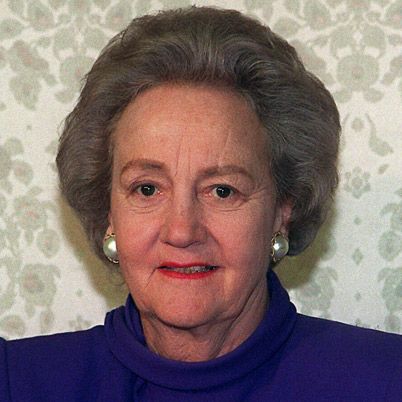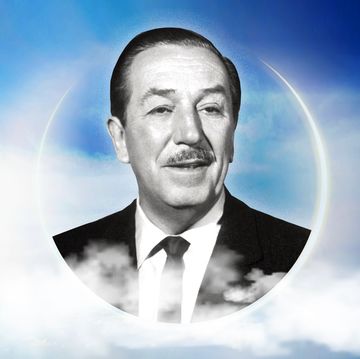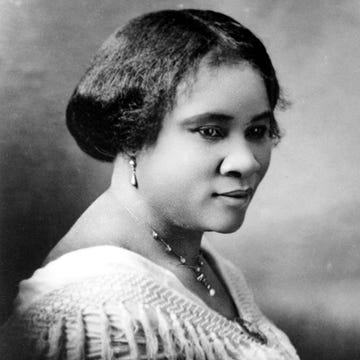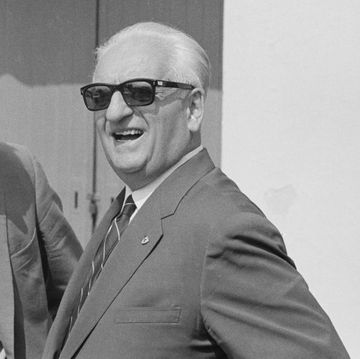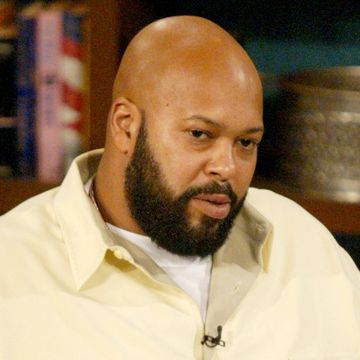(1917-2001)
Who Was Katharine Graham?
As head of the Washington Post Company (1963-91) and publisher of the Washington Post (1969-79), Katharine Graham (1917-2001) became one of the world's most powerful women. She was publisher when the Post defied the United States government to publish the classified Pentagon Papers and when two reporters brought the Watergate scandal to light during Richard Nixon's presidency. Graham also led her business to financial success, becoming the first female CEO of a Fortune 500 company. In 1998, she was awarded the Pulitzer Prize for her memoir, Personal History (1997).
Early Life
Katharine Graham was born Katharine Meyer on June 16, 1917, in New York City. Graham was the fourth of five children. She grew up in a wealthy household, with many luxuries, but was not close to her parents. They even neglected to tell her that her father was purchasing the Washington Post, so learning of its acquisition was a surprise.
Graham attended Vassar before transferring to the University of Chicago, where she received her undergraduate degree in 1938. She next went to San Francisco and worked as a reporter.
Marriage and Children
After returning to Washington, D.C., Katharine Meyer met Phil Graham, a Supreme Court clerk, in the fall of 1939. Following an intense romance, the two married on June 5, 1940. They had four children together: daughter Elizabeth (nicknamed Lally) in 1943 and sons Don, Bill and Stephen, born in 1945, 1948 and 1952, respectively.
As was typical for the time, Graham took care of their home and family while Phil focused on his career. When her father needed a successor at the Washington Post (Graham's brother wasn't interested), he turned to Phil, who became the paper's publisher in 1946. Graham accepted this as natural, and even went along when her father wanted Phil to have a larger share of stock than his wife.
Phil went through a severe depression in 1957. By the 1960s he was showing symptoms of manic depression; he would sometimes drink heavily and make impulsive purchases. He also disparaged Graham and made jokes at her expense. In December 1962, Graham learned Phil was having an affair when she accidentally heard her husband and his mistress on the phone together.
Phil demanded a divorce and control of the Post, but put aside this request after entering a facility for treatment. In August 1963, having been granted a weekend pass, Phil came to the couple's farm. There, he was able to access a gun and kill himself.
Katharine Graham and the 'Washington Post'
On September 20, 1963, Graham was elected president of the Washington Post Company. She'd never planned for such a job, but her husband had recently committed suicide. Taking charge of the business meant Graham could eventually pass it along to her children.
Her new role wasn't an easy one for Graham, as she felt ill-prepared and nervous, so much so that she found herself working on how best to say, "Merry Christmas" before an office holiday party. Though she lacked training, the Post had been a part of Graham's life since her father bought the paper at a bankruptcy auction in 1933. She'd also worked for the publication in different capacities, including stints in the editorial and circulation departments.
Working with Ben Bradlee
Graham eventually started to hire people herself instead of relying on holdovers from her husband's time as publisher. One such hire was Ben Bradlee, who became the Post's managing editor in 1965.
Bradlee's selection was unusual, as he came from Newsweek instead of the Post newsroom, but it ended up being a wonderful choice, as he worked to improve the quality of the paper. Graham considered Bradlee a partner; though they had disagreements, theirs was a fruitful relationship that saw the Post become one of the country's best newspapers.
The Pentagon Papers
Graham became the Washington Post's publisher in 1969. On June 17, 1971, she made the difficult decision to have the Post publish the classified Pentagon Papers. Excerpts from these documents, which delved into the history of U.S. involvement in Vietnam, appeared the next day.
Graham took this step after the New York Times, the first newspaper to land a set of the Papers, had been barred from further publication by court order. Her legal team feared that publishing might imperil her company — if the Justice Department pursued criminal sanctions, it could put an in-progress stock offering and television licenses at risk. Yet Graham also knew that the newsroom, after struggling to obtain the documents, would resent any delay in publication, and she feared losing talented people.
Graham was vindicated by a 6-3 Supreme Court ruling, issued on June 30, 1971, which supported freedom of the press and stated that the information in the Pentagon Papers didn't place government security at risk. Her actions helped elevate the national profile of the Post.
The decision to publish is dramatized in a 2017 film, The Post. Meryl Streep plays Graham, while Tom Hanks appears as Bradlee.
The Watergate Scandal
After a break-in at Democratic National Committee headquarters in the Watergate complex on June 17, 1972, two reporters at the Washington Post — Bob Woodward and Carl Bernstein — dug into the story. They would uncover a tale of corruption and complicity that would link back to Richard Nixon's White House, but unearthing the scope of the scandal took time, during which the Nixon administration did its best to minimize the story and disparage the Post.
Between December 29, 1972, and January 2, 1973, challenges were made to the license renewals of Post Company television stations in Florida. Company stock went from $38 a share in December to $21 a share in May. There was no direct connection between the Nixon administration and these challenges, but tapes made in Nixon's office would later reveal the president saying on September 15, 1972, "The main thing is the Post is going to have damnable, damnable problems out of this one. They have a television station … and they’re going to have to get it renewed.… And it’s going to be God damn active here.…"
Though Graham sometimes wondered if the entire Watergate story would ever be brought to light, she consistently supported her reporters. In the end, the existence of Nixon's tapes was revealed and the president resigned, leaving Graham grateful to no longer be a target of his administration.
Career Accomplishments and Women's Rights
After taking over at the Washington Post Company, Graham was often the only woman at meetings. Her ability to contribute was usually dismissed by the men around her, which Graham, who'd been raised to believe women were men's intellectual inferiors, usually accepted. But she could be determined, as she would demonstrate during a strike in 1975-1976 when she refused to re-hire union members who'd damaged Post presses.
In a 1969 interview, Graham said, "I think a man would be better at this job I’m in than a woman." And when women working at Newsweek, which her company owned, filed a complaint with the Equal Employment Opportunity Commission in 1970, Graham wondered, "Which side am I supposed to be on?" (The case was decided in the women's favor, though change was resisted inside the magazine.) However, Graham came to support women more — such as refusing the invitation when asked to a dinner at the Gridiron Club in 1972, as the organization didn't admit women at the time.
Graham's son Don became publisher of the Washington Post in 1979 while she stayed on as the chief executive officer. When Graham left this position in 1991 (she served as chairman until 1993), revenues had grown from $84 million in 1963 to $1.4 billion; stock rose 30 times in value during her tenure.
Social Connections
In 1966, Truman Capote, the author of In Cold Blood, offered to throw Graham a party. This became the Black and White Ball, which took place on November 28, 1966, at New York City's Plaza Hotel. Guests included celebrities, artists, socialites and random picks by Capote. Graham dubbed herself a "middle-aged debutante" for the event, which was a huge success.
As the Post and Graham climbed in stature, she became a well-known hostess in her own right. Dinners at her home were some of the most sought-after invitations in Washington, D.C. Graham also tried not to let politics or partisanship dictate her social circle; her friends included Adlai Stevenson, Warren Buffett (who also invested in her company and offered financial advice), Henry Kissinger, Nancy Reagan and Gloria Steinem.
Death and Legacy
Graham died in Boise, Idaho, on July 17, 2001. A few days earlier she'd been attending a media conference in Sun Valley, where she fell and suffered a head injury.
Graham's funeral was held on July 24, 2001, at the Washington National Cathedral. Given her impact on Washington, D.C. and the world, more than 3,000 people attended.
Graham headed the Post during a profitable and groundbreaking era, but times grew tougher for newspapers after her death. In 2013, the Graham family sold the Washington Post to Amazon founder Jeff Bezos for $250 million.
QUICK FACTS
- Birth Year: 1917
- Birth date: July 16, 1917
- Birth State: New York
- Birth City: New York
- Birth Country: United States
- Gender: Female
- Best Known For: Katharine Graham was America’s first female Fortune 500 CEO. As publisher of the Washington Post, she guided the newspaper to national prominence, most notably when it published The Pentagon Papers and reported on the Watergate scandal.
- Industries
- Journalism and Nonfiction
- Business and Industry
- Astrological Sign: Cancer
- Schools
- University of Chicago
- Vassar College
- Death Year: 2001
- Death date: July 17, 2001
- Death State: Idaho
- Death City: Boise
- Death Country: United States
Fact Check
We strive for accuracy and fairness.If you see something that doesn't look right,contact us!
CITATION INFORMATION
- Article Title: Katharine Graham Biography
- Author: Biography.com Editors
- Website Name: The Biography.com website
- Url: https://www.biography.com/business-leaders/katharine-graham
- Access Date:
- Publisher: A&E; Television Networks
- Last Updated: September 16, 2019
- Original Published Date: April 2, 2014
